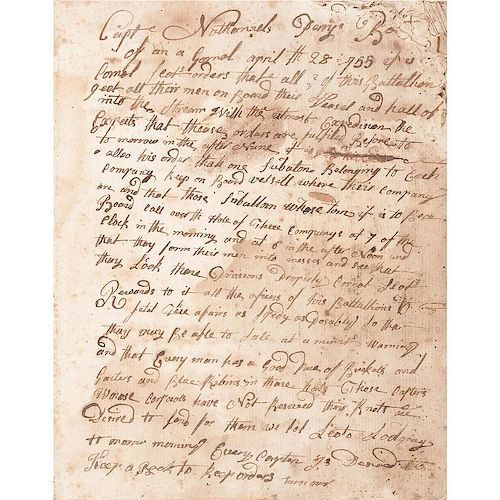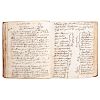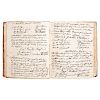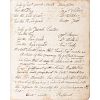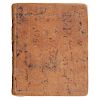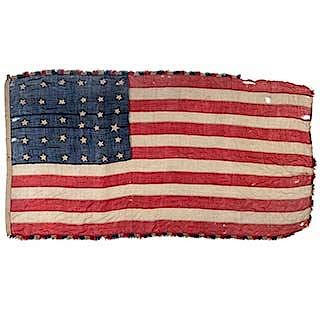French & Indian War, Manuscript Orderly Book, Recorded by Captain Nathaniel Perry, 1755-1756
About Seller
6270 Este Ave.
Cincinnati , OH 45232
United States
With offices in Cincinnati, Cleveland and Denver, Cowan’s holds over 40 auctions each year, with annual sales exceeding $16M. We reach buyers around the globe, and take pride in our reputation for integrity, customer service and great results. A full-service house, Cowan’s Auctions specializes in Am...Read more
Two ways to bid:
- Leave a max absentee bid and the platform will bid on your behalf up to your maximum bid during the live auction.
- Bid live during the auction and your bids will be submitted real-time to the auctioneer.
Bid Increments
| Price | Bid Increment |
|---|---|
| $0 | $25 |
| $500 | $50 |
| $1,000 | $100 |
| $2,000 | $250 |
| $5,000 | $500 |
| $10,000 | $1,000 |
| $20,000 | $2,500 |
| $50,000 | $5,000 |
| $100,000 | $10,000 |
About Auction
Nov 17, 2017 - Nov 18, 2017
Cowan's Auctions dawnie@cowans.com
- Lot Description
French & Indian War Orderly Book. Leather bound. Approx. 100pp, 6.5 x 8 in. Written by Captain Nathaniel Perry (1713-1756) of Easton, MA. Perry’s entries begin on April 28, 1755, and end on January 22, 1756. Approximately 50pp of the book are specifically war-dated. The remainder of the book consists of notations added following Captain Perry’s death at Fort Cumberland in June 1756. These later additions, most likely added by two of Captain Perry’s sons with whom he served and their descendants, primarily include Perry family genealogies and miscellaneous records of account spanning the decades following the French and Indian War. This original, unpublished manuscript represents a valuable piece of French & Indian War history.
This rare orderly book was kept by Captain Nathaniel Perry while he served in the Second Battalion of the Massachusetts regiment under the immediate command of Lt. Colonel John Winslow, and under the overall command of Colonel Robert Monckton. The book stands apart immediately because of its large size and its beautiful leather cover on which the letters “N” and “P” as well as the years “1755” and “1756” can faintly be observed. More significantly, the dates of Captain Perry’s entries coincide with The Battle of Fort Beauséjour and the commencement of the Great Expulsion (1755-1762) – the forcible removal of thousands of Acadians from Nova Scotia by British forces. The Battle of Fort Beauséjour marked the opening of a major offensive by the British against the French as part of the French and Indian War. In the months following their victory, British forces occupied Fort Beauséjour (later renamed Fort Cumberland) and began the expulsion of Acadians from Nova Scotia. While much of Perry’s book records the regular occurrences of military life such as troop movements, court martials, the officer of the day, daily orders and passwords (“parole”), the book also provides insight into the military operations which initiated the expulsion of thousands of Acadians from their homes.
Nathaniel Perry was born in 1713 in Sandwich, Massachusetts, to Benjamin Perry, son of Ezra Perry who emigrated from England in the mid-1600s. He married the widow Mehitable Leonard Willis in 1736, and settled in Easton, Massachusetts. The couple had four children: Nathaniel (1738), Lydia (1740), Samuel (1742), and James (1745). Perry appears to have had an extended history of military service pre-dating his time in the French and Indian War, as he is credited with authoring a drill book for the Massachusetts militia which dates from 1751.
As tensions mounted between the British and the French over the Acadian territory north of Puritan New England, Fort became a flash point for conflict. Built in 1751, the French stronghold was of significant strategic importance. Recruitment for an English attack on Fort Beauséjour was undertaken by Colonel William Shirley of Massachusetts who also served as Governor of the Province of Massachusetts Bay. On June 6, 1754, Perry received his commission from Governor Shirley to serve as Captain of a regiment under Colonel John Winslow. Initially, Captain Perry raised a company of 46 men but by May 1755 he had raised a company of nearly 100 men to serve as part of the Second Battalion of Shirley's Regiment. Serving alongside their father in this company were Captain Perry’s sons, Nathaniel and Samuel.
Approximately 270 British regulars and approximately 2000 New England militia, including Captain Perry’s regiment, left Boston bound for Fort Beauséjour in May 1755 via a convoy of transports and warships. Perry documented preparations for this journey in the book’s first entry on April 28, 1755, in which he notes that Lt. Colonel George Scott “orders that all of this Battalion get all their men on Board their Veasel,” tend to their affairs “as speedy as posably so that they may be able to sale at a minits warning,” and that “Every captain is desired to Keep a Book to keep orders.” This orderly book then represents Captain Perry’s compliance with the official orders from his commanding officer. On April 30, an entry continues to discuss the transports, but he then for unknown reasons flipped his book over and began writing the remainder of his entries from the reverse side. On the reverse he picks up again on the same day, writing that “no Officers, non-commissioned officers, or soldiers presume upon any pretence, whatsoever to come to shoar without leave from his Field Officers – The Captains are to stay on shoar to collect their stragling men and put them on board a vessel appointed to send them down.” In his last entry before the Battle of Fort Beauséjour, dated May 2, 1755, Perry writes, “All the capts. of the second Battalion are to repair with their stragling men on board the sloop [blank] commanded by [blank] Carrington Marten now lying on the North side of the long Wharf Near the end. And that they appear tomorrow morning at 9'o'clock on board their particular transport with an exact return of their company ….” Perry then notes that there are "No more Battalion orders till June."
One of the first engagements of the French and Indian War, Battle of Fort Beauséjour commenced on June 3, 1755, when over two thousand British soldiers under the command of Robert Monckton besieged the fort and the much smaller French force inside. The French withstood the siege for thirteen days before surrendering on June 16. Perry and his company participated in the assault on the French stronghold, and his first entry in the orderly book upon arrival in Nova Scotia is dated "June 8, 1755 Beauséjour." At this point the Battle of Beauséjour was well underway. Perry lists the basic orders of the day: “Parole, Hallifax, Countersign Nova-Scotia/ a return was ordered to be given of the strength of each corps which has not been given by Col. Winslow nor Col. Scotts battalion. It is desired they may be given in tomorrow morning – 50 Men from the two Battalions is wanted for work tomorrow by day break…”
Perry's entries from June 8th through the 17th follow a similar fashion listing first the parole and then orders. During the course of the siege he mentions the need for soldiers to be certain to return tools which have gone missing and are "essential to the Services we are now upon," and the need for officers to be particularly careful when building fires in their encampments. Perry notes other issues as well, including that “The Commanding Officers observing this day a great and unnecessary Expence of Ammunitions some men having fired two or three rounds It is therefore Ordered that the men who want ammunition shall be charg’d two pence sterling for each cartridge which is not expended in Actual Duty by Order from their Officers…” On June 14, Perry lists the number of soldiers doing duty as 1,701 which included “Regulars 244,” “Winslow’s 807” and “Scott’s 656.” Interestingly, Perry does not make particular reference on the 16th or 17th of June to the surrender of the French forces. The next entry, "Fort Cumberland July 19th," indicates the new English name of the fort and is the only reference that the fort has changed hands.
The entry of July 19 is significant in another way as well. Perry mentions that "the soldiers stroll daily from their camps to plunder the Inhabitants & destroy their cattle," and that soldiers are stealing goods from the fort. The former part of this statement is particularly important because it suggests the beginning of hostilities against the local inhabitants, many of whom were non-combatants. In the weeks and months following the Battle of Beauséjour, English soldiers began a campaign against the local Acadians who remained in the area, some of whom fought with the French, but many whom attempted to remain neutral in the conflict. In his August 11 entry Perry records the official order notifying Acadians detained at Fort Cumberland that they were declared rebels and that their belongings were forfeited to the British Crown. "All Officers and Soldiers all Settlers followers Retainers to the camp are hearby desired to take notice that all horses [illegible] cows, sheep and all other cattle whatever which were formerly the property of the franch inhabitants are … forfeited to his majesty...” These men were then held as prisoners at the fort until their transports arrived to deport them.
British troops continued with forays into the countryside where they would round up Acadians, destroy their settlements, and prepare the locals for deportation. French and Acadian resistance continued in the area though, and one such expedition encountered a guerilla fighting force which dealt the British a lethal blow. Major John Frye and his detachment departed Fort Cumberland on August 28th headed to clear Acadian settlements on the Petitcodiac River. On September 2, 1755, at the Battle of Petitcodiac, Major Frye and his men were attacked suffering heavy casualties. Historical accounts have offered differing numbers of British dead, but on September 30 Captain Perry records “A List of the men that were lost at Petitcodiac of Major Fryes detachment on the 2 Sept 1755.” This list includes the names of 23 men killed.
Besides references to the British incursions into Acadia and their treatment of the local inhabitants, Perry meticulously records notes on fort duty with entries occurring nearly every day between July 19, 1755 and January 22, 1756. The majority of Perry’s entries follow a similar format: date listing next to parole, followed by listing of officer “For the Day” and “For Guard.” This information is then followed by camp orders or battalion orders. Colonel Monckton, Lt. Colonels Winslow and Scott, Major Frye, and Ft. Lawrence are often referenced. Perry provides regular descriptions of court martials including the names of the men who were being tried and their indiscretions (drunkenness, stealing, disrespect to fellow officers, etc.), and the penalty applied (typically 100 lashes). Other notable entries include a list of 38 "Names of Invalids Discharged from Lt Coll Scott's Batallion on 29 of July 1755 and paid to the 18th of Aug."
January 22nd appears to be Captain Nathaniel Perry’s last entry. Perhaps he was no longer responsible for maintaining the orderly book or, more likely, poor health prevented him from discharging this duty. Surviving letters from Captain Perry to his wife indicate that Perry became ill while serving at the fort and desired to return home. This would not be the case, however, as he died of illness on June 15, 1756, at Fort Cumberland in Nova Scotia.
The remaining pages in the book record miscellaneous statements of account, religious verses, poems, and notes on Perry family genealogy including births, deaths, and marriages dating as late as the 1800s. It is likely that one of Captain Perry’s sons who served alongside him retained the book after his death thereby accounting for the later notations that are specific to Perry family history. A small number of these later notations are interspersed within Captain Perry’s entries but do not affect the legibility of his records.
Provenance: Consignor purchased the orderly book at auction in Buffalo. Previous owner purchased it at auction of contents from a general store in West Bethany, New York, approximately 40 miles from Buffalo. While no documented link could be traced directly to Capt. Nathaniel Perry, settlement records from Bethany Township do indicate several early settlers with the last name Perry, and by mid-to-late 1800s two prominent Perry citizens are residing in Bethany Township (later West Bethany).
Expected wear including some soiling, toning, and minor foxing, but good condition overall given age. Legible handwriting. Leather binding partially split along spine but book remains well-intact. Several pages from earliest entries are missing upper right corner affecting small amounts of text. Approximately ten pages have been removed from the center of the book, however, these do not appear to have included any of Capt. Perry's French & Indian War entries. A few pages within the orderly book have been cut, but the notations on these pages all appear to have been of a later origin than the original orderly book entries.Condition
Eliminate the Hassle of Third-Party Shippers: Let Cowan's Ship Directly To You!
If you'd like a shipping estimate before the auction, contact Cowan's in-house shipping department at shipping@cowans.com or 513.871.1670 x219. - Shipping Info
-
Eliminate the Hassle of Third-Party Shippers: Let Cowan's Ship Directly To You!
If you'd like a shipping estimate before the auction, contact Cowan's in-house shipping department at shipping@cowans.com or 513.871.1670 x219.
At the request of the buyer, Cowan's will authorize the shipment of purchased items. Shipments usually occur within two weeks after payment has been received. Shipment is generally made via UPS Ground service. Unless buyer gives special instructions, the shipping method shall be at the sole discretion of Cowan's Auctions, Inc.. Cowan's is in no way responsible for the acts or omissions of independent handlers, packers or shippers of purchased items or for any loss, damage or delay from the packing or shipping of any property.
-
- Buyer's Premium



 EUR
EUR CAD
CAD AUD
AUD GBP
GBP MXN
MXN HKD
HKD CNY
CNY MYR
MYR SEK
SEK SGD
SGD CHF
CHF THB
THB